Citizens groups are concerned that three infra projects, two of which cleared on VC during the lockdown, sound trouble for both, Goas thriving eco-system and the livelihood of those who depend on it
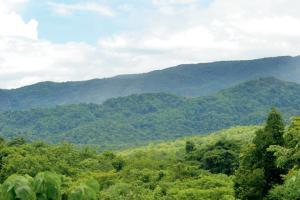
Bhagwan Mahaveer Wildlife Sanctuary and Mollem National Park in Goa are a treasure trove of flora and fauna, and is part of a larger contiguous forest and an important tiger corridor between Goa and Karnataka. Pic/Parag Rangnekar
Sprawled across a 240 sq km protected area, located in the Western Ghats in Sanguem taluk, the Bhagwan Mahaveer Sanctuary and Mollem National Park in Goa are rich in rare flora and fauna. The area, which contains pristine vegetation classified as West Coast tropical evergreen forests, West Coast semi-evergreen forests and moist deciduous forests, was declared a wildlife sanctuary in 1969. The parkland contains several geological, cultural attractions that make it a popular destination in the state of Goa. "Dudhsagar Falls, which is Goa's tallest waterfall and India's fifth tallest, is located in the same area. While the waterfall remains shut during the monsoon, it sees about 2,000 tourists every day from October to May. These travellers include both foreigners and Indians of all age groups. But soon, this is going to come to end," rues Aakash Madgavkar, executive member, managing committee of the Travel & Tourism Association of Goa (TTAG).
ADVERTISEMENT
Goa is set to lose around 55,000 trees and 185 hectares of forest cover for three projects—widening of the existing National Highway 4A, railway line double-tracking and construction of a new power line. Following the clearances of these projects in June this year, a group of 149 scientists, academicians, conservationists, artists, allied professionals as well as concerned citizens wrote to India's Environment Minister Prakash Javadekar stating that the Bhagwan Mahaveer Wildlife Sanctuary and Mollem National Park in Goa together are a "treasure trove of flora and fauna, and is part of a larger contiguous forest and an important tiger corridor between Goa and the adjoining Kali Tiger Reserve in Karnataka." "The Bhagwan Mahaveer Wildlife Sanctuary and Mollem National Park, parts of which are located in Mollem and Kalay Panchayat, provide a wealth of provisioning services. The protected area and its surrounding natural areas have been a source of timber, medicinal plants, culturally important wild plants and sacred plants and groves to the people of Mollem and Kalay Panchayats. Should these projects sanctioned by the MoEFCC go ahead, water scarcity will increase not just in Mollem Panchayat, but also across Goa since these forests contribute water to Khanderpar River through provisioning and regulating services. Their impact will be further compounded by climate change and associated natural disasters," reads the letter.
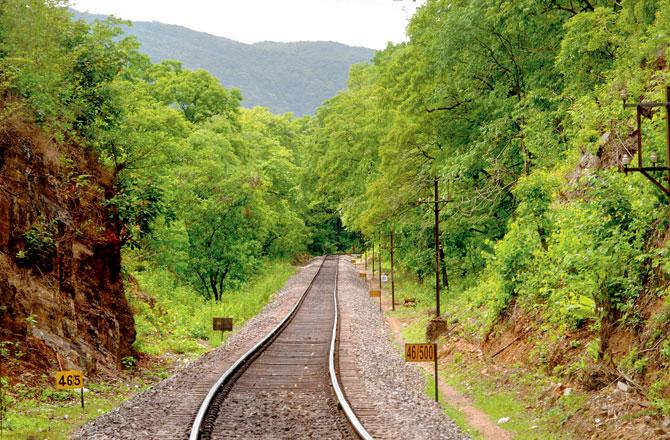
The railway track expansion is said to impact Idionyx gomantakensis. Pic/Parag Rangnekar
Interestingly, two of these projects were cleared during the COVID-19 lockdown in April via video-conferencing by the standing committee of the National Board of Wildlife. "We are not entirely opposing the projects, but we don't see any positives. We want to know if the existing railway facilities or the existing highway are used to maximum capacities. If not, then what is the desperation to sanction these projects during the lockdown?" asks Madgavkar, who fears this will have a direct impact on the tourism industry of Goa.
So, in the first week of July, members of the TTAG wrote to Javadekar, too. The TTAG is the apex body representing the Hotel & Travel Trade in Goa. The members of the non-profit are from related industries such as hoteliers, travel agents, tour operators and airlines. Raising concerns over the projects, the letter says, "The 2019-2020 tourist season began with unseasonal weather and tropical storms and is now facing the COVID-19 pandemic. This pushes us to strengthen natural capital and ecosystem resilience to strengthen the future of tourism in Goa. In this context, the three proposed projects will not only change patterns of land-use but significantly affect the tourism potential of these areas."
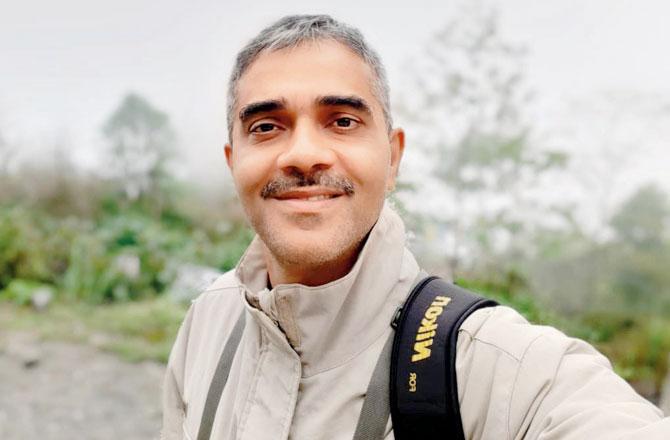
Parag Rangnekar
The letter stated that deforestation from these projects will adversely affect the future development of hinterland tourism, "which directly opposes the state's 25-year vision [approved in 2019] to revamp the economy". Explaining this, Madgavkar says, "The government has been saying that it wants to promote hinterland tourism and ecotourism in Goa for over a decade now. But each year after the budget is released, there is no policy formulated regarding the same. And now, they plan to simultaneously carry forth all the three projects. This is not a joke; can you imagine the impact it will have on the ecosystem?"
Parag Rangnekar, a biologist in Goa, agrees. Rangnekar is also one of the signatories of the letter sent to Javadekar in June. "There are two dragonfly species, which are endemic to the Western Ghats. In fact, the type locality of idionyx gomantakensis [Goan shadow dancer] is adjacent to the railway track, which is proposed to be expanded. It has been recorded in a few locations elsewhere in the Western Ghats. But, this [the area close to the proposed railway tracks] is the only location in Goa where it has been traced. The project will directly impact this species," Rangnekar tells us.
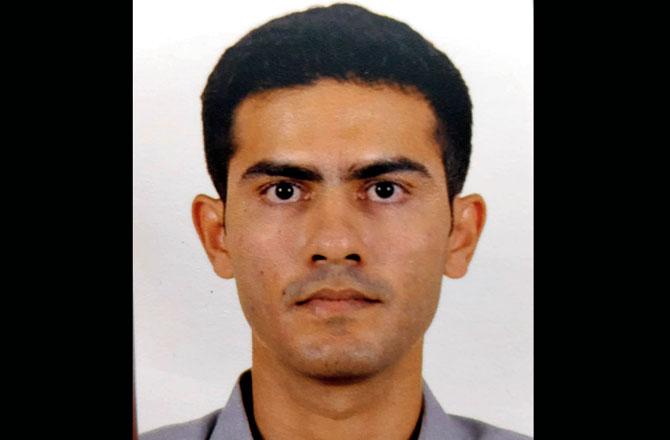
Aakash Madgavkar
Their letter also reveals that the protected area is home to more than 721 plant species, 235 bird species, 219 butterfly species, 80 odonate species, 70 mammal species, 75 ant species, 45 reptile species, 44 fish species, 43 fungi species, 27 amphibian species, 24 orchid species, and 18 species of lichens.
Rangnekar further adds that the Environmental Impact Assessment (EIA) for the transmission line is not in public domain. "They say EIA is done for all the three projects. While for the transmission line, EIA is not available for the public to see, the one done for the railway line is pretty decent. They have done an extensive survey and acknowledged that the project will have an impact, but what needs to be done about it has not been mentioned anywhere," Rangnekar informs.
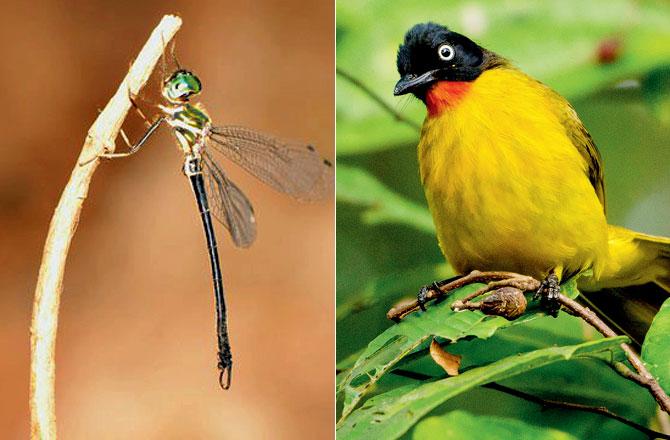
The type locality of idionyx gomantakensis is recorded near the railway track, which is proposed to be expanded. Pic/Parag Rangnekar; (Right) This protected area is also home to the Goa state bird, flame-throated bulbul (pycnonotus gularis). Pic/Omkar Dharwadkar
The biologist says that the EIA on the highway contains check-list of mammals and not birds. He says, "No attempt has been made to quantify the richness or species abundance in the project area. A quick reference to eBird, a citizen science portal, suggests a presence of 235 species for the Bhagwan Mahaveer WLS, which is an Important Bird and Biodiversity Area (IBBA) as identified by the Bombay Natural History Society (BNHS) for Birdlife International, UK. Several groups of taxa have not been surveyed at all in the road EIA, including all the insect orders and other taxa such as fresh water fish."
This protected area is also home to of all Goa's state symbols: the state tree (terminalia tomentosa), the state animal (gaur, bos gaurus) and the state bird (flame-throated bulbul, pycnonotus gularis). The rivers and forest streams also provide water to a large human population in the district of North Goa.
Major stakeholders of not just tourism, but environment and bio-diversity in Goa have started the citizen's fight to protect the clearing of forest land at the Bhagwan Mahaveer Wildlife Sanctuary and Mollem National Park. Most recently, a new page on Instagram called, Amche Mollem, is being used to raise awareness about the rich diversity to be impacted by the development projects.
185
The total area in hectares of forest cover in Goa that will be lost to the three projects
Catch up on all the latest Mumbai news, crime news, current affairs, and a complete guide from food to things to do and events across Mumbai. Also download the new mid-day Android and iOS apps to get latest updates.
Mid-Day is now on Telegram. Click here to join our channel (@middayinfomedialtd) and stay updated with the latest news
 Subscribe today by clicking the link and stay updated with the latest news!" Click here!
Subscribe today by clicking the link and stay updated with the latest news!" Click here!






